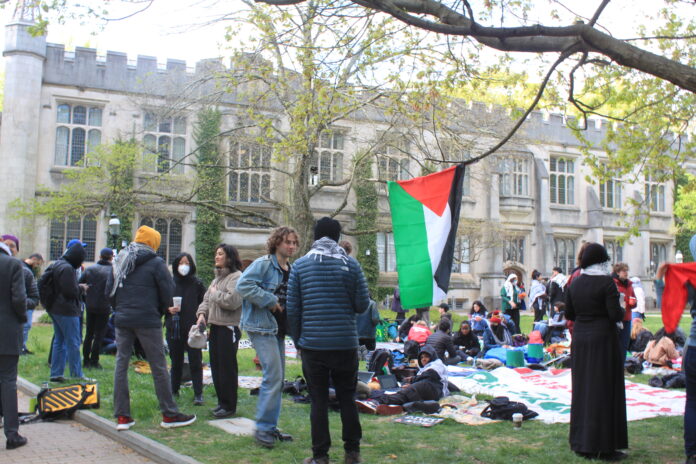Princeton University undergraduate and graduate students gathered for a pro-Palestinian sit-in on campus early on April 25 in a show of solidarity with similar sit-ins and protests at colleges and universities across the United States.
The first students began setting up tents in the McCosh Courtyard around 7 a.m., according to published reports in The Daily Princetonian, which is the Princeton University student newspaper.
Administrators had earlier warned students that anyone who refused to leave at the request of university officials would be arrested and barred from campus.
Within minutes of the tents being set up, two graduate students were arrested by Princeton University public safety officers. They lost their campus housing and have been barred from campus, pending disciplinary action, according to The Daily Princetonian.
The tents were disassembled immediately. The protestors sat on the lawn, while a small contingent of counter-protesters stood nearby for a short time.
The number of protesters grew from a handful to about 300 or so by noon. They had set up signs proclaiming “Welcome to the Popular University for Gaza,” “Free Palestine,” “No Justice, No Peace,” and “From the river to the sea, Palestine will be free.”
A black, green, red and white Palestinian flag fluttered in the breeze.
A demand sheet handed out to protesters called for an immediate cease-fire in the Israel-Gaza conflict. It also demanded broader transparency on Princeton University investments and to end weapons research funded by the U.S. Department of Defense, according to The Daily Princetonian.
The protesters demanded that Princeton University divest from companies that profit from or engage in the State of Israel’s ongoing military campaign, occupation and apartheid policies.
The demands included a ban on associating with Israeli academic institutions and businesses, and to cultivate relationships with Palestinian institutions, instead.
Around 1 p.m., some student protesters gathered for prayers. Prayer rugs were laid out on the grass, and the prayer leader led about 30 students in prayer.
Other students formed a circle around those in prayer to block bystanders’ view, holding kaffiyehs – the traditional Palestinian head covering – and a blue tarp, blankets and other textiles.
The rest of the protesters sat on blankets and tarps in the courtyard.
The protesting students held a brief press conference. One speaker claimed the protest was being held in solidarity with student protests at other colleges and universities, nationally and internationally.
“We are staying (in the encampment) until Princeton University divests or we are forcibly removed,” said Princeton University graduate student Aditi Rao.
Also at the press conference, Princeton University junior Emanuelle Sippy said that 70% of the 34,000 Palestinians who have been killed since Israel responded militarily in Gaza are women and children. Thousands more have been injured.
“The atrocities that were committed on Oct. 7 were horrific and they do not change the fact that in the last six months, 34,000 Palestinian lives have been taken,” Sippy said.
When Princeton University student Maximillian Meyer interjected and asked whether the protesters endorsed Hamas and its stated plans to kill Jews, Sippy did not respond directly.
Meyer said later that about 10 counter-protesters turned out when the protesters began setting up their tents around 7 a.m. The counter-protesters soon left.
Meyer said the protesters are activists who have an “un-nuanced world view.” Hamas is calling for the genocide and destruction of Jews worldwide, he said.
Students don’t want to be vilified, said Meyer, who was holding small American and Israeli flags. They don’t want to become enemies.
“Jewish students just want to go to class and be safe,” Meyer said.


